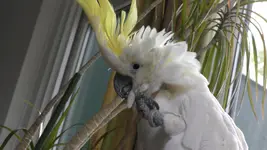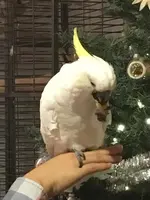Awesome!!! I totally agree 100% with going with that diagnosis based on her reproductive history...And yes, if the liquid in her belly was NOT clear, but rather red, brown, or green, then it's not being collected due to a heart or kidney issue, but rather due to infection for sure. I've drained many a belly of birds, reptiles, and dogs due to either cardiac or kidney issues, and it's always clear or opaque-yellow. If the fluid contain specific-bacteria, then based on her reproductive history you guys made the right call...And that would also make it easy for your CAV to prescribe the correct antibiotic therapy as well...
So even though this is very, very scary, as Peritonitis always is in anyone, it's been caught early and the correct treatment started early, and it's something that once it's gone, it's gone for good and not a worry any longer, as opposed to a heart or kidney issue, so it's definitely the lessor of two-evils in this situation. And I have to say that I'm very, very happy that she is eating on her own, that's such a positive sign!!! Usually with Peritonitis they are so sick and feel so absolutely miserable that they can't even be syringe fed, they have to be tube-fed because they just want nothing to do with food at all...So the fact that she's eating on her own at all, even if it's just a little bit, is amazingly awesome!!! This is a great Christmas present!!!
***In-regard to the hormone implant, I highly recommend talking to your CAV about the Deslorelin implant, as we have had incredible success at my avian/reptile rescue with it. In-contrast to some of the other hormone implants/injections, such as Lupron and other "Depot" hormone treatments, the Deslorelin implant (we use the 4.7mg or the 9.5mg implants, not the 2.1mg) has had a 100% success rate at the rescue in completely stopping the production of follicles/eggs. We've had very spotty success with all of the others, and it seems like some vets are so familiar with the older hormone treatments like Lupron that they hesitate to try anything different, even though Lupron has about a 50/50 chance of working (and it also has some unpleasant side-effects as well)...But since our CAV switched-over to prescribing us solely the Deslorelin implants, every single bird we've given them to has stopped producing follicles completely. And the Deslorelin implants (sometimes called "seeds") are just that, tiny little "seed-like" implants that are injected using a small-gauge, special syringe right under the skin, either on the back or on the breast, and it's no more invasive than giving them any other injection.
With Lupron and any of the other "Depot" hormone treatments, you have to give them a dosage that is usually somewhere between 400mg and up to 1000mg, and usually this is given to them by injection once every month. And you have to play around with the dosage until you find one that will stop the production of follicles/eggs, which means that you start out with the smallest dose, wait for a month, give them another injection of the same dose (if they didn't lay any eggs or produce any follicles during that first month), and then wait until they do lay eggs again, then up the dose, etc. It's a pain in the butt, and often times even at the highest "safe" dose of Lupron, which still carries a lot of nasty side-effects, it still doesn't stop the production of eggs, or it may work for a month or two and then the bird lays more eggs, you up the dose or give injections more frequently than once a month, all of which carry pretty serious risks. Lupron Depot also carries a very high rate of ovarian cancers directly resulting from it's use, simply because of how high a dose you have to give them for it to be effective, and the fact that you have to give this very high dose to them once every month or every 3 months...
With the Deslorelin implants, usually we use a 4.7mg implant and it lasts for 3 months. You can opt for the 9.5mg implant, which can work up to 6 months, but our CAV doesn't recommend using the longer-acting implants because often times the efficacy wears-off earlier anyway, which he thinks is due to the degradation of the implants...But with just the 4.7mg implants we've seen 100% cessation of egg-laying in every bird we've given them to, with absolutely no side-effects at all except for some localized swelling around the site of the implant, but that's rare and doesn't usually cause any problems anyway. And usually they actually start working within 2-3 weeks of implantation, and you can see a great difference in ovarian activity after 2 weeks of getting the implant in their blood hormone-levels...And as far as them getting the implants, it's seriously not a big deal at all. The larger the bird, the less of a deal it is. They are all subcutaneous, meaning they are put right under the skin (the do not have to be put into the muscle, like some other hormone implants have to be). Some vets put them under the skin on their backs, between their "shoulder-blades", while others put them under the skin on their breasts. Our CAV doesn't use any anesthesia or even Isoflurene Gas when he's injecting the implants, however some vets prefer to use either Isoflurene Gas or another short-acting sedation...In a larger bird like Kiki it is much easier and more like just giving them a "shot". Our CAV will have someone else (me, lol) towel the bird and hold them with their breast exposed, and they will give the bird a small injection of Lidocaine to completely numb their breast tissue, which doesn't hurt them at all. Then he either uses a scalpel to make a very small "stab" incision right under the skin, OR with the larger birds he uses a special syringe that actually makes a small "hole" under the skin. Then he injects the implant into the incision/hole, right under the skin with a normal syringe that has a special type of dull needle that just injects the tiny little implant into the hole. Then he puts a dab of skin-glue over the incision area, and their skin heals right over the implant in a matter of days. The entire process takes less than 5 minutes, and the larger birds do great without any sedation; even the medium-sized birds like Sun/Jenday/Nanday Conures, Senegals, smaller Amazons, Pionus, etc. do just fine with no sedation at all and just a Lidocaine injection...You will notice quite a difference in the birds behavior in about 2-3 weeks, with egg production ceasing completely after the injection of the implant...And then you have it done once every 3-6 months, depending on what dose of implant you choose to use, but the interesting thing is that he doesn't always have to remove the old implant, sometimes it is completely absorbed by the body, sometimes it's still there and he'll remove it when putting in the next injection. But it goes very smoothly and works wonders...We've also used the Deslorelin implant a couple of times to treat birds with certain reproductive cancers, and it's helped quite a bit...




